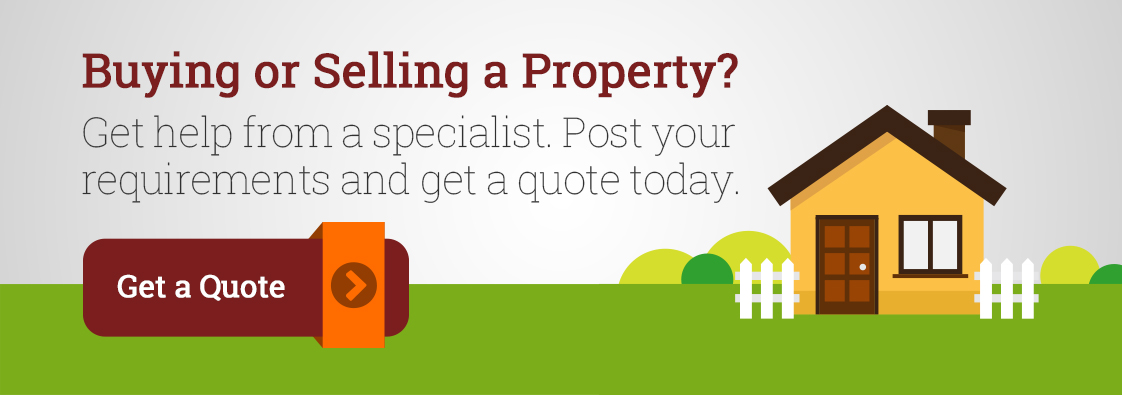Buying and Selling a Property
Buying and selling property is one of the most important financial transactions that most individuals will ever be involved with.
For many Brits, getting onto the property ladder is a milestone in their lives: a mark of security, success and maturity. Even with the national newspapers reporting the housing market as ‘stagnant’, tonight, people from all over the country will be rushing home from work to attend house viewings and repainting hallway walls to keep up appearances before a showing.
Speaking to the Telegraph last year, the Chief Executive of Anxiety UK, Nicky Lidbetter, remarked that moving house is ‘one of life's most stressful experiences’. A sentiment that I’m sure many who have been through a move will agree with.
Getting prepared before buying or selling a property is essential to reducing the impact that transaction can have on your stress levels. Having an idea over what to expect can make the process seem less daunting and far more manageable.
Below, we have detailed the processes involved with buying and selling a property, explained how a Conveyancing Solicitor can assist at each point and answered some of the questions people most commonly ask about moving house.
Buying a Property
Whether you are buying a house or flat, there are certain process that you should expect to come across when buying a property. Below, we have given an overview of the house buying process.
Preparing to buy a property
Following the excitement of finding your ideal property, it is time to get prepared to buy. It is recommended that you contact your mortgage company and Conveyancing Solicitor early on to ensure that everything is in place in good time.
Once you are prepared, it is time to make an offer.
Property Searches
Once the offer has been accepted, it is time for the property searches to take place. Property searches are conducted by Conveyancing Solicitors when buying a house or flat to discover any additional information that the buyers should know about the property they plan to purchase.
Property searched usually involve:
- Local authority searches
- Water and drainage searches
- Environmental searches
Once the searched have been completed, your solicitor will relay the findings to you.
Contract Negotiations
After the investigations have been completed, contract negotiations may be required before the exchange of contracts.
Exchange of Contracts
For buyers, the exchange of contracts will be one of the most exciting processes involved with buying property. At this stage, the solicitors representing both parties in the transaction will read out the contracts of their respective clients to ensure that the two are identical.
The solicitors will then agree on a completion date and send the contracts to each other immediately. Only once the contracts have been exchanged does the transaction become legally binding.
Generally when buying a house, once the contracts have been exchanged, your Conveyancing Solicitor will:
- Hand over your deposit to the seller’s solicitor
- Prepare a final completion statement for your approval
- Collect any balance of funds required
- Prepare the deed of transfer and mortgage deed and arrange for you to sign them
- Organise final searches to check for debts and bankruptcy
Completion
Once the money has been received by the seller, you will be free to collect your keys from the estate agents and move into your new home. At this point in the house buying process, your solicitor will tie up any loose ends including:
- Receiving and arranging for payment of any Stamp Duty to Revenue & Customs
- Preparing and sending off application to Land Registry to register your ownership
- Sending deeds to the lender (if the property is mortgaged)
As you can see, there is a lot to consider when buying a property, but, with the assistance of a specialist Conveyancing Solicitor, the process gets considerably more manageable.
Understandably, with a transaction as important as buying a house or flat ahead of them, buyers tend to have a lot of questions.
Below, we have addressed some of the questions that are most frequently asked:
Buying a Property FAQs
How much Stamp Duty will I pay when buying a property?
The amount of Land Tax Stamp Duty you will pay when buying a house is dependent of the price of the property.
The table below details the different rates of Stamp Duty that buyers will be required to pay:
| Property or lease premium or transfer value | SDLT rate |
|---|---|
| Up to £125,000 | Zero |
| The next £125,000 (the portion from £125,001 to £250,000) | 2% |
| The next £675,000 (the portion from £250,001 to £925,000) | 5% |
| The next £575,000 (the portion from £925,001 to £1.5 million) | 10% |
| The remaining amount (the portion above £1.5 million) | 12% |
If you are buying a property as a second home, you will pay an additional 3%.
What is the difference between buying Leasehold property and Freehold property?
It is essential to know the difference between Leasehold and Freehold property when buying a house or flat.
Leasehold Property
With Leasehold property, you have a lease to use the property for a set number of years. This requires a contract with the freeholder.
Freehold Property
With Freehold property, you own the building and the land it stands on outright.
If you are considering buying a property, instructing a solicitor is essential from the outset.
When you find a Conveyancing Solicitor through LawBid, you get a quote for your conveyancing fees upfront. Having a quote for your fees is a great way to prepare for your move; allowing you to budget and ensuring that there are no nasty surprises once the process is complete.
Head to our Conveyancing page for more information, or post some details about the property you are planning to buy and get a quote for your conveyancing fees today.

Selling a Property
As with buying a property, there are certain processes that you should expect to be involved with when selling a property.
Selling a house or flat can be even more daunting than buying. Whilst preparation is key with buying, there is a great deal more to consider when selling a property. After notifying your mortgage company, deciding whether you will continue to live in the property in the meantime, arranging who will actually sell your home and ensuring your property is spick and span, it is time to hire a solicitor to deal with the legal side of the transaction.
Below, we have detailed the different processes involved with selling a property and explained how a Conveyancing Solicitor can assist at all points.
Preparing to sell a property
Contacting your mortgage company, finding an estate agent and contacting a solicitor are all essential when preparing to sell your house or flat.
To help ensure that your property is sold quickly and at the right price, there are several things you can do to increase its desirability. Decluttering and repainting are a great place to start.
Buyer Investigations
When selling a house or flat, buyers will carry out investigations on the property. A Conveyancing Solicitor can assist you with responding to any questions they might have.
Agreement of Sale
Once sale has been agreed, your Conveyancing Solicitor will:
- Prepare and send out a package of legal information and a contract for sale
- Request a settlement figure for your mortgage and any other secured loans
- Liaise with all relevant parties and negotiate a date for moving (‘completion’)
Exchange of Contracts
Once any changes to the contracts have been negotiated and the length of time between exchange and completion has been agreed, the Conveyancing Solicitors representing both parties in the transaction will exchange contracts.
This essentially involves both solicitors reading out the contracts of their respective clients to ensure they are identical and exchanging them once satisfied.
Following the exchange of contracts, your Conveyancing Solicitor will:
- Receive the deposit as a down-payment
- Organise final accounts and prepare a final settlement for your approval
- Collect any balance of funds required,/li>
- Approve the deed of transfer and arrange for you to sign it
Completion
This is the final stage involved with selling a property. The day of completion is when you transfer ownership, accept payment and handover the keys to the property.
Your solicitor will:
- Pay off the mortgage and notify Land Registry
- Hand over the deeds and send any balance of money to you
Now that the keys have been handed over and payment has been received, it is time to move out of your home and into your new property.
The amount of paperwork and legal processes involved with selling a house or flat can make it seem daunting. However, with the support of a Conveyancing Solicitor, your experience needn't be a negative one.
With so much to consider before selling a property, clients tend to have a lot of questions and queries when selling up. Below are two of the most frequently asked questions when selling a house or flat:
Selling a Property FAQs
How long will it take?
Giving an estimate over the amount of time it will take to sell a property can be tricky. Location, the condition of the property and the current market all have an affect on how long it takes to sell. However, in certain circumstances a buyer will be in the right place at the right time, leading to a quick and easy sale.
Regardless of how long it takes to sell your property, your chosen Conveyancing Solicitor will ensure that the process is as hassle-free as possible.
At what point is the contract legally binding?
The buyer or the seller can pull out of the transaction at any point until the contracts have been exchanged. At this point, the transaction becomes legally binding.
As with buying, getting a quote for the conveyancing fees allows you to budget effectively when selling a property. Post some details about your property to get a quote and find a specialist conveyancing solicitor today.


